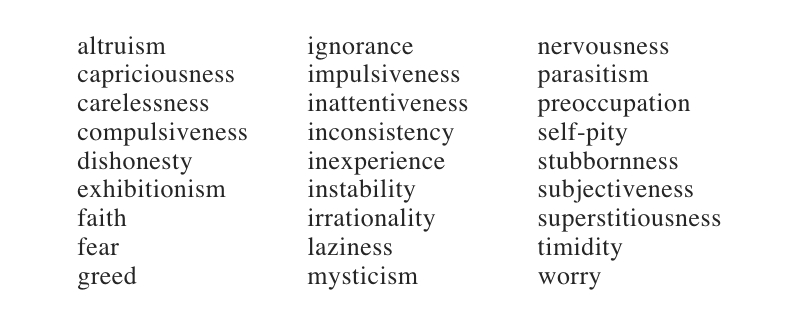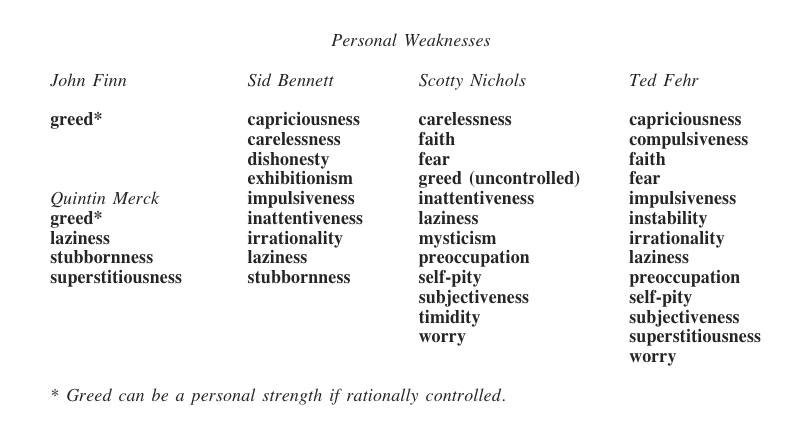Personal Weaknesses, Favors, and Bribes
1. Personal Weaknesses, Favors, and Bribes
Most poor poker players become hooked on or involved in games through their personal weaknesses. The good player exploits those weaknesses. He knows that almost all players have one or more of the following weaknesses:

Each personal weakness grows out of a player’s resistance to objective thinking, discipline, and rational behavior.
The good player identifies and records the personal weaknesses of each opponent in his notebook. He then uses those weaknesses to influence their playing decisions, to read their hands, and to manipulate them into faster betting paces, higher stakes, and poorer-quality poker. He regularly reviews and revises his notes on their weaknesses in order to—
- refresh his memory
- devise new and better ways to manipulate his opponents
- better understand each opponent
- detect changes in opponents.
John Finn identifies and lists the personal weaknesses of his poker opponents as shown in the above chart. Indeed, the following incident shows how John uses his opponents’ personal weaknesses to win extra money:
Missing his flush in draw poker, John finds himself in a good position to bluff, so he bets $50. Scotty and Sid fold immediately. Ted Fehr holds two pair and thinks he should drop, but is desperate and considers calling. John must prevent him from calling.
Everyone knows that Ted is superstitious about pennies and never keeps any… especially when gambling. So when Ted leans over and shows Sid his hand, John takes a penny from his pocket and slips the coin onto the edge of Ted’s money.
“Call!” Sid bellows as he gazes blankly at Ted’s two pair. “He’s got nothing.”
“Yeah,” Ted says and then grins as he picks up his pile of money to call. “What!” His grin fades as the penny tumbles from the money. “No wonder I’m losing!” he yells while picking up the coin and throwing it across the room. As the penny bounces off the wall and rolls around the floor, Ted folds his hand and says, “At least that penny made me fold. I saved fifty bucks…” His voice fades when John shows his winning hand… a four flush. Ted’s eyes water. His superstition cost him a $200 pot.
Consider another example of John’s exploitation of an opponent’s weakness:
Sid Bennett injures his foot and cannot leave the house. At the last moment, John switches the game to Sid’s house so the injured loser can play. Knowing Sid’s house will lack a good supply of food, John stops at a delicatessen and invests in a gigantic Italian submarine sandwich nicely wrapped in cellophane.
At three in the morning, Scotty Nichols grips his stomach. He rummages through Sid’s bare kitchen and finds a couple handfuls of dry cereal to eat.

The next hand is seven-card stud, high-low with two twists. John’s hole cards are the ace and the joker25 ; he has another ace face-up… the best possible start for high-low poker. He wants the maximum number of callers. Now is the time to use his investment. He reaches under the chair and pulls the huge sandwich from a brown paper bag. All eyes turn toward the juicy submarine. Scotty moans as his tongue laps his puffy lips.
John lays the elongated sandwich across the pot. “The winners split it,” he declares… Scotty’s face is sweating, and his stomach is growling.
With eyes fixed on the sandwich, everyone calls the first bet. John aggressively bets his strong hand. Many players keep calling. The final bets are large. Scotty keeps calling with a poor hand. “Should fold,” he says, catching his breath. “But that sub … yum.” The redfaced man spends over $100 on calls. Three other players also call as their eyes remain fixed on the sandwich. The pot is the largest of the night—over $700. John wins both high and low with an ace-high full house and a six-five low. He also wins back the sandwich, which he later used to build another pot.
With a small investment, John Finn exploits opponents’ lack of discipline to win may extra hundreds of dollars.
The good player continually exploits man’s most pervasive weakness—laziness. Laziness foments desires to gain values without effort. That, in turn, leads to seeking unearned approval, respect, and money. The good player uses those desires to manipulate his opponents with “favors” that symbolize (and falsely promise) approval, respect, and money. His victims bend to his will in seeking those pseudo favors.
_______________________
25The joker (also called the bug) is a wild card for low, an ace for high, and good for filling straights and flushes. In high-low games the joker can be used as both a high card and a low card in the same hand.
“Favors and bribes that the good player extends and withdraws for his personal profit include—
- loans
- advice
- compliments
- sympathy
- showing of cards.
Out of the loser’s desire for “favors” and approval from a respected winner, the good player can often get, for example, a loser’s support for changes in house rules that further benefit the good player at the loser’s expense (e.g., faster-paced games and higher stakes).